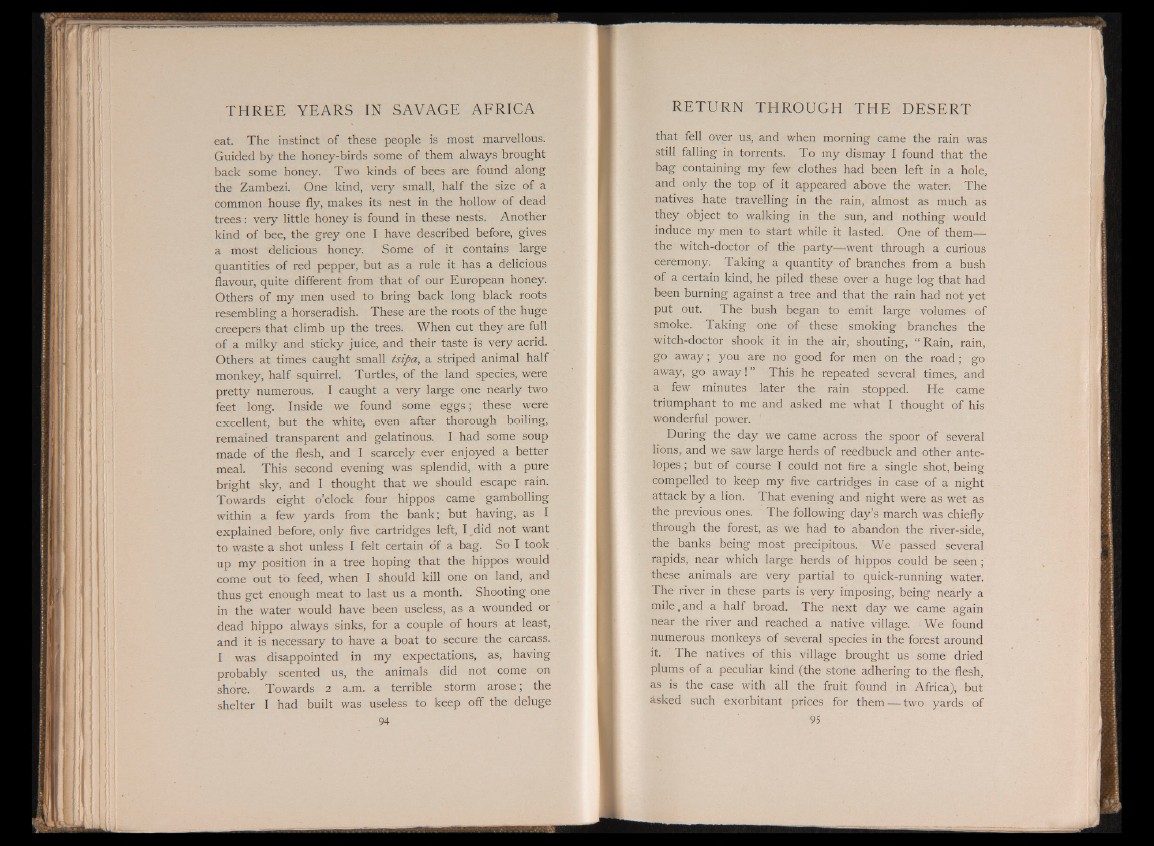
eat. The instinct of these people is most marvellous.
Guided by the honey-birds some of them always brought
back some honey. Two kinds of bees are found along
the Zambezi. One kind, very small, half the size of a
common house fly, makes its nest in the hollow of dead
trees: very little honey is found in these nests. Another
kind of bee, the grey one I have described before, gives
a most delicious honey. Some of it contains large
quantities of red pepper, but as a rule it has a delicious
flavour, quite different from that of our European honey.
Others of my men used to bring back long black roots
resembling a horseradish. These are the roots of the huge
creepers that climb up the trees. When cut they are full
of a milky and sticky juice, and their taste is very acrid.
Others at times caught small tsipa, a striped animal half
monkey, half squirrel. Turtles, of the land species, were
pretty numerous. I caught a very large one nearly two
feet long. Inside we found some eggs; these were
excellent, but the white, even after thorough boiling,
remained transparent and gelatinous. I had some soup
made of the flesh, and I scarcely ever enjoyed a better
meal. This second evening was splendid, with a pure
bright sky, and I thought that we should escape rain.
Towards eight o’clock four hippos came gambolling
within a few yards from the bank; but having, as I
explained before, only five cartridges left, I did not want
to waste a shot unless I felt certain of a bag. So I took
up my position in a tree hoping that the hippos would
come out to feed, when I should kill one on land, and
thus get enough meat to last us a month. Shooting one
in the water would have been useless, as a wounded or
dead hippo always sinks, for a couple of hours at least,
and it is necessary to have a boat to secure the carcass.
I was disappointed in my expectations, as, having
probably scented us, the animals did not come on
shore. Towards 2 a.m. a terrible storm arose; the
shelter I had built was useless to keep off the deluge
94
that fell over us, and when morning came the rain was
still falling in torrents. To my dismay I found that the
bag containing my few clothes had been left in a hole,
and only the top of it appeared above the water. The
natives hate travelling in the rain, almost as much as
they object to walking in the sun, and nothing would
induce my men to start while it lasted. One of them—
the witch-doctor of the party—went through a curious
ceremony. Taking a quantity of branches from a bush
of a certain kind, he piled these over a huge log that had
been burning against a tree and that the rain had not yet
put out. The bush began to emit large volumes of
smoke. Taking one of these smoking branches the
witch-doctor shook it in the air, shouting, “ Rain, rain,
go away; you are no good for men on the road; go
away, go away! ” This he repeated several times, and
a few minutes later the rain stopped. He came
triumphant to me and asked me what I thought of his
wonderful power.
During the day we came across the spoor of several
lions, and we saw large herds of reedbuck and other antelopes;
but of course I could not fire a single shot, being
compelled to keep my five cartridges in case of a night
attack by a lion. That evening and night were as wet as
the previous ones. The following day’s march was chiefly
through the forest, as we had to abandon the river-side,
the banks being most precipitous. We passed several
rapids, near which large herds of hippos could be seen;
these animals are very partial to quick-running water.
The river in these parts is very imposing, being nearly a
mile, and a half broad. The next day we came again
near the river and reached a native village. We found
numerous monkeys of several species in the forest around
it. The natives of this village brought us some dried
plums of a peculiar kind (the stone adhering to the flesh,
as is the case with all the fruit found in Africa), but
asked such exorbitant prices for them — two yards of
95